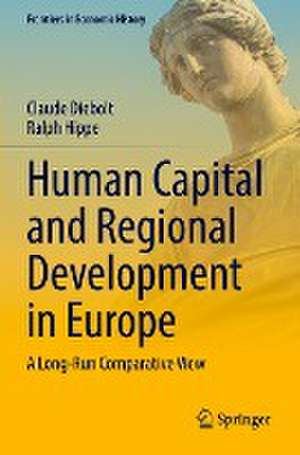Human Capital and Regional Development in Europe: A Long-Run Comparative View: Frontiers in Economic History
Autor Claude Diebolt, Ralph Hippeen Limba Engleză Paperback – 9 ian 2023
| Toate formatele și edițiile | Preț | Express |
|---|---|---|
| Paperback (1) | 577.54 lei 6-8 săpt. | |
| Springer International Publishing – 9 ian 2023 | 577.54 lei 6-8 săpt. | |
| Hardback (1) | 583.61 lei 6-8 săpt. | |
| Springer International Publishing – 8 ian 2022 | 583.61 lei 6-8 săpt. |
Preț: 577.54 lei
Preț vechi: 679.47 lei
-15% Nou
Puncte Express: 866
Preț estimativ în valută:
110.51€ • 115.38$ • 91.46£
110.51€ • 115.38$ • 91.46£
Carte tipărită la comandă
Livrare economică 04-18 aprilie
Preluare comenzi: 021 569.72.76
Specificații
ISBN-13: 9783030908607
ISBN-10: 3030908607
Pagini: 141
Ilustrații: XIX, 141 p. 21 illus. in color.
Dimensiuni: 155 x 235 mm
Greutate: 0.24 kg
Ediția:1st ed. 2022
Editura: Springer International Publishing
Colecția Springer
Seria Frontiers in Economic History
Locul publicării:Cham, Switzerland
ISBN-10: 3030908607
Pagini: 141
Ilustrații: XIX, 141 p. 21 illus. in color.
Dimensiuni: 155 x 235 mm
Greutate: 0.24 kg
Ediția:1st ed. 2022
Editura: Springer International Publishing
Colecția Springer
Seria Frontiers in Economic History
Locul publicării:Cham, Switzerland
Cuprins
Chapter 1. Introduction.- Chapter 2. Regional human capital inequality in Europe.- Chapter 3. Spatial clustering of numeracy and literacy.- Chapter 4. Human capital and market access in the European regions.- Chapter 5. The long-run impact of human capital on innovation and economic growth in the regions of Europe.- Chapter 6. Lessons from human capital evolution over the last 200 years.- Chapter 7. Conclusion and future directions for research.
Notă biografică
Claude Diebolt is a CNRS Research Professor of Economics at the University of Strasbourg, France. His research focuses on the cliometrics of growth and economic cycles. He is the founder and the editor in chief of the journal Cliometrica. He is also the co-editor of the Handbook of Cliometrics and was the organizer of the 8th World Congress of Cliometrics. Claude Diebolt is the founding President of the French Cliometric Association, a former Chair of the Board of Trustees of the Cliometric Society, and a former President of the French Economic Association.
Ralph Hippe is an expert in the Department for Learning and Employability at the European Centre for the Development of Vocational Training (CEDEFOP), Thessaloniki, Greece. Prior, he was a scientific officer in the Human Capital and Employment Unit of the European Commission's Joint Research Centre in Ispra, Italy and Seville, Spain. He also worked as a postdoctoral researcher at the London School of Economics on the development of the knowledge economy within a green growth framework. He was a consultant in a World Bank project, a visiting researcher at IDDRI/Sciences Po Paris, France and lecturer at Sciences Po Strasbourg, France and University of Tübingen, Germany. Hippe has (co-)authored more than 30 publications, including various articles in peer-reviewed journals.
Textul de pe ultima copertă
Human capital is of utmost importance for the future of our knowledge economies and societies. However, it is unequally distributed in Europe, contributing to marked spatial patterns of economic prosperity within and across countries. In many cases, these patterns have a long history. To understand them better, it requires to go back in time, when mass schooling was starting to become a reality across Europe. Taking a long-run perspective over more than 150 years, this book shows the development and the distribution of human capital in the regions of Europe and its connections with the economy. It provides insights into recent research findings in this area, including theoretical advances and the use of new empirical data.
Caracteristici
Shows the development and the distribution of human capital in Europe and its connections with the economy Presents a long-run perspective over more than 150 years Introduces theoretical advances and the use of new empirical data











